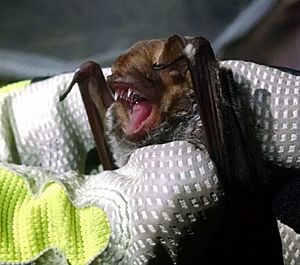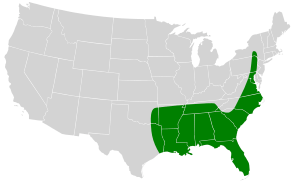Seminole bat facts for kids
Quick facts for kids Seminole bat |
|
|---|---|
 |
|
| Conservation status | |
| Scientific classification |
|
| Kingdom: | Animalia |
| Phylum: | Chordata |
| Class: | Mammalia |
| Order: | Chiroptera |
| Family: | Vespertilionidae |
| Genus: | Lasiurus |
| Species: |
L. seminolus
|
| Binomial name | |
| Lasiurus seminolus (Rhoads, 1895)
|
|
 |
|
| Script error: The function "autoWithCaption" does not exist. | |
Script error: No such module "Check for conflicting parameters".
The Seminole bat (Lasiurus seminolus) is a type of bat that lives in the southeastern United States. It is part of the family called Vespertilionidae, also known as "vesper bats." These bats are known for their unique reddish-brown fur and how they move between different areas during the year.
What Does It Look Like?
The Seminole bat is often confused with the red bat because they look similar. This bat has a beautiful mahogany color. Its fur looks a bit "frosted" because the hairs on its back have white tips.
These bats are quite small. They usually weigh around 12 grams, which is about the same as a few paper clips. Female Seminole bats are typically a little larger than the males.
Where Do They Live?
The Seminole bat lives in the southeastern United States. You can find them in states like Louisiana, Georgia, Alabama, Mississippi, and South Carolina. They also live in parts of Texas, Tennessee, Arkansas, and North Carolina. Sometimes, they are even seen as far south as Mexico.
These bats are migratory species. This means they travel to different places depending on the season.
- In the winter, they often stay along the Gulf Coast. They also spend winter in North and South Carolina, and southern Arkansas.
- In the summer, they fly north. They can travel as far as Missouri and Kentucky.
Seminole bats prefer to live in forested areas. During the winter, they often use leaf litter and Spanish moss to keep warm. They use these materials as insulation in the places where they rest.
What Do They Eat?
Seminole bats are insectivores. This means their diet is made up almost entirely of insects. They are very good at catching flying insects in the dark.
They eat a lot of different kinds of insects, including:
- Hymenoptera: This group includes ants, bees, and wasps.
- Coleoptera: These are beetles.
- Lepidoptera: This group includes moths.
They also eat smaller amounts of other insects like:
See also
 In Spanish: Lasiurus seminolus para niños
In Spanish: Lasiurus seminolus para niños
 | Janet Taylor Pickett |
 | Synthia Saint James |
 | Howardena Pindell |
 | Faith Ringgold |


